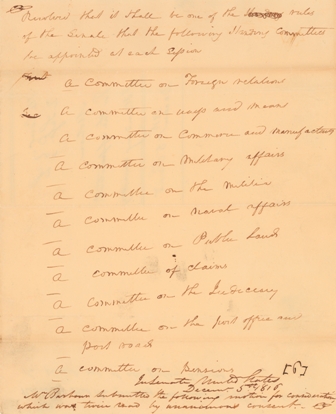Senate Judiciary Committee, May 1st: AG William Barr and The Department of Justice’s Investigation of Russian Interference with the 2016 Presidential Election
Dirksen Senate Office Building 226; Senate Judiciary Committee
Watch Video:
| Majority Members (12) | Minority Members (10) |
|---|---|
| Graham, Lindsey (SC), Chairman Grassley, Chuck (IA) Cornyn, John (TX) Lee, Mike (UT) Cruz, Ted (TX) Sasse, Ben (NE) Hawley, Josh (MO) Tillis, Thom (NC) Ernst, Joni (IA) Crapo, Mike (ID) Kennedy, John (LA) Blackburn, Marsha (TN) |
Feinstein, Dianne (CA), Ranking Member Leahy, Patrick J. (VT) Durbin, Richard J. (IL) Whitehouse, Sheldon (RI) Klobuchar, Amy (MN) Coons, Christopher A. (DE) Blumenthal, Richard (CT) Hirono, Mazie K. (HI) Booker, Cory A. (NJ) Harris, Kamala D. (CA) |
| DATE: | Wednesday, May 1, 2019 | ADD TO MY CALENDAR |
| TIME: | 10:00 AM, EDT | |
| LOCATION: | Dirksen Senate Office Building 226 | |
| PRESIDING: | Chairman Graham |
WITNESSES
→
Established in 1816 as one of the original standing committees in the United States Senate, the Senate Committee on the Judiciary is one of the most influential committees in Congress. Its broad legislative jurisdiction has assured its primary role as a forum for the public discussion of social and constitutional issues. The Committee is also responsible for oversight of key activities of the executive branch, and is responsible for the initial stages of the confirmation process of all judicial nominations for the federal judiciary.
Origin
 1816 Senate Resolution establishing the Standing Committees of the Senate.
Center for Legislative Archives, National Archives and Records Administration. |
The delegates to the Constitutional Convention of 1787 did not provide for congressional committees when they drafted the Constitution of the United States. Nevertheless, a select committee of eight Senators, often suggested to be the precursor to the present-day Judiciary Committee, was appointed one day after the Senate first convened in 1789. The select committee was tasked with drafting what would become the Judiciary Act of 1789. This landmark Act established the present three-tiered hierarchy of the federal judiciary, and the Office of the Attorney General.
Temporary committees commonly convened in the House and Senate during the early years of Congress. The small size of Congress made it unnecessary to create permanent committees. In the Senate, ad hoc committees were comprised of three to five members depending on the issues assigned. These committees met as needed to discuss issues at their desks in the Senate chamber.
The rapid growth of the nation after the turn of the 19th century and the increase in the number of members of Congress resulted in greater complexity in the federal lawmaking process. Elected officials in both the Senate and House recognized that the legislative business of the rapidly expanding country could no longer be addressed within the structure of select committees. In a resolution adopted on December 10, 1816, the Senate established the body's original standing committees, including the Committee on the Judiciary. The House Judiciary committee had been established three years earlier.
-
The Honorable William P. BarrAttorney GeneralDepartment of JusticeWashington , DC
More Articles
- Select Committee to Investigate the January 6th Attack on the United States Capitol
- Dereliction of Duty: Examining the Inspector General’s Report on the FBI’s Handling of the Larry Nassar Investigation
- Jo Freeman Reviews Electing Madam Vice President by Nichola D. Gutgold
- Nichola Gutgold Writes: “Klob-mentum” and the Pronouns To Help
- Monday, Dec.9th, 2019: House Judiciary Hearing to Receive Counsel Presentations of Evidence in the Impeachment Inquiry of President Donald Trump
- 10 AM, EST, Wednesday Hearings Livestreamed: The Impeachment Inquiry into President Donald J. Trump; Constitutional Grounds for Presidential Impeachment
- Updated: Mueller's Testimony Expected on *July 24th in Front of House Judiciary and Intelligence Committees
- Biden, Klobuchar Rankings by the Lugar Center Highest Among Presidential Candidates Who Built Bipartisan Collaboration in the Senate
- The Letter Sent to AG Wm. Barr From Special Counsel Robert S. Mueller, III on the Investigation Into Russian Interference in the 2016 Presidential Election
- If You're Looking For A Link To the Mueller Report, Look No Further







